Self Driving Shuttles: The Dawn of a Revolution
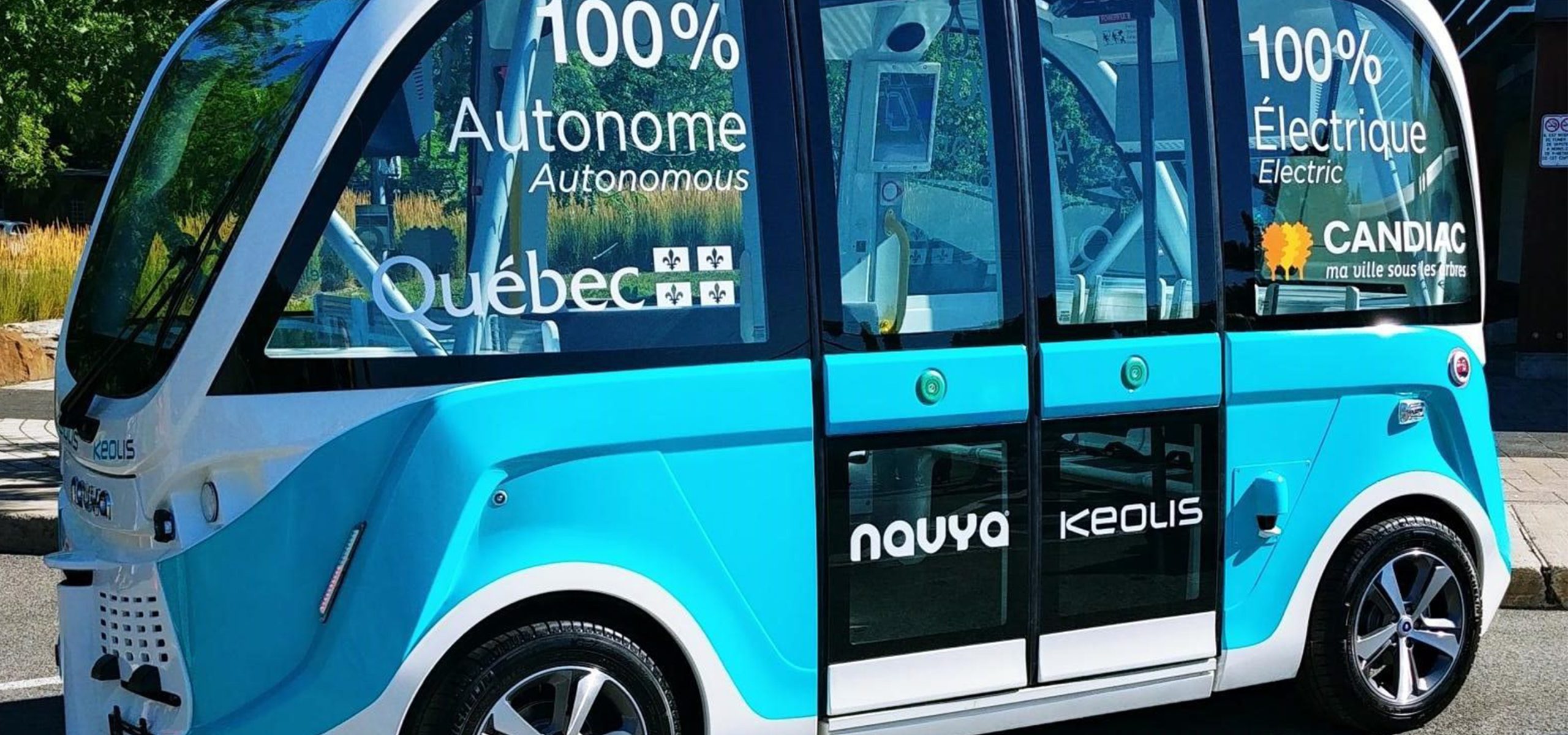
With a high concentration of world‑class researchers in artificial intelligence, the province is currently a leader in the development of smart navigation systems.
While we have come a long way since the advent of ABS brakes, this driver assistance technology was the first breakthrough in vehicle intelligence, which today promises to transform the world of transportation. The experts agree: we are at the dawn of a major revolution.
The technology is now advanced enough that many cities are diving feet first into autonomous transport pilot projects. In Quebec, Bill 165 has given the minister the authority to greenlight initiatives that will bring self‑driving vehicles and shuttles into the public realm. The Canadian government is also working with the provinces on a national strategy that should be announced in 2019.
Quebec’s weather remains a major challenge. Existing smart navigation systems are still struggling to deal with the full range of weather conditions, especially snow. Although the vehicles aren’t 100% autonomous yet, they soon will be. The PIT Group, a research center affiliated with advanced technology research organization FPInnovations, is currently working with a consortium of Quebec companies to design and build a self‑driving shuttle that works in Quebec’s challenging winter conditions in the next three years.
Transportation that’s truly intelligent
Self‑driving vehicles will be used, first and foremost, to improve public transit. This could mean picking people up at their homes and taking them to high‑performance transit system stations, like those of the REM.
Says Yves Provencher, Director of Business Development and Emerging Markets with the PIT Group, “What we’d eventually like to see is a decrease in single‑passenger vehicles.”
It’s an important point. If everyone owned a self-driving vehicle, the revolution could quickly become a nightmare. “Imagine what it would be like if everyone who works in downtown Montreal got dropped off by their self‑driving cars in the morning and then all those cars went home to avoid paying for parking. Then the cars would come back to pick up their owners at the end of the day. There would constantly be cars on the road. The traffic would be insane!” says Yves Provencher.
“At the very least we need to develop shared vehicle services, like Car2Go but with self‑driving vehicles. It would be even better if we could get shuttles transporting fifteen or so riders at once.”
For Marie-Hélène Cloutier, Vice President of Passenger Experience, Marketing and Sales with Keolis Canada, “Modern, reliable self-driving shuttles could potentially dissuade people from using their vehicles. That would improve traffic flow while reducing the number of accidents on the road, driving‑related stress, and greenhouse gas emissions.”
Quebec all set to lead
Quebec could become one of the dominant players in the global smart vehicle industry, especially when it comes to self‑driving shuttles. With a high concentration of world‑class researchers in artificial intelligence, the province is currently a leader in the development of smart navigation systems.
Not to mention that, over the years, Quebec has acquired considerable expertise in the design of public transit vehicles (as opposed to passenger vehicles), giving the province an undeniable competitive advantage in the development of smart vehicles for public transit.
Autonomous transport for a prosperous future
The advent of autonomous transport and the corresponding decrease in traffic, fuel consumption, and vehicle accidents could save Canadians $65 billion per year. These new technologies would lead to the creation of hundreds of jobs and the rise of new economic sectors.[1]
[1] Report by Comité sénatorial permanent des transports et des communications. Paver la voie. Technologie et le futur du véhicule automatisé. January 2018.
Continue reading on this subject

The challenges of designing a 40-tonne, 100% electric mining vehicle for open-pit mines
Partnerships and implications The partners involved in the development of a 100% electric Quebec mining vehicle were all eager to be involved with the project from the outset, for a variety of reasons. NRC’s Eddy Zuppel explained their contribution: “Before starting the project, it was important to model and simulate the vehicle’s route in order […]
Read more
Will industrial strategies chart a new course for the future of Quebec industries?
The Quebec economy—and more broadly the world economy—faces multiple challenges: the climate crisis, supply chain problems, labour shortages, inflation, etc. Quebec has an abundant supply of resources, know-how, and expertise; however, the next points on its agenda should include structuring, developing, and planning industrial activities.
Read more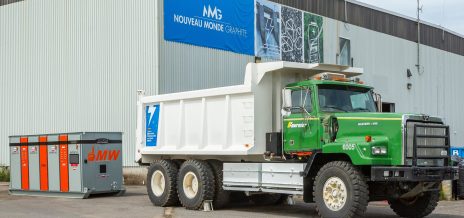
Electric mining service vehicle for the open-pit mining industry: Test phase starts in summer 2022
The Innovative Vehicle Institute (IVI), Propulsion Québec, and the partners of the electric mining vehicle (EMV) project—Adria Power Systems, Dana TM4, L. Fournier et Fils, Nouveau Monde Graphite, CanmetMINING, Natural Resources Canada and National Research Council Canada (NRCC)—are pleased to announce the start of a nine-month test phase of an open-pit mining vehicle and its infrastructure, starting in summer 2022 at the Nouveau Monde Graphite mine in Saint-Michel-des-Saints.
Read more
Ambition EST 2030 : a roadmap for propelling Quebec to the forefront of the electric and smart transportation industry by 2030
Propulsion Québec, the cluster for electric and smart transportation, is announcing Ambition EST 2030, a roadmap for the electric and smart transportation (EST) industry developed in partnership with Deloitte.
Read more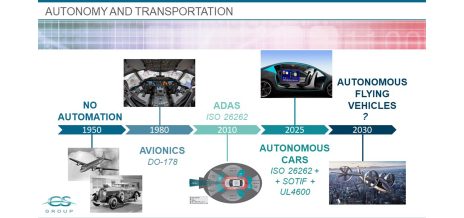
LiDAR and AI in autonomous vehicle commercialization and functional safety
The story of smart, autonomous transportation began nearly half a century ago. In the early 1980s, avionics systems started to replace more traditional mechanical and hydraulic systems through calculators and embedded software.
Read more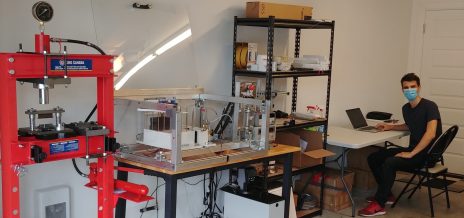
Reinventing working from home – How a Sherbrooke start-up managed to continue activities despite the pandemic …. in a garage!
One of our members, Calogy Solutions, a young company focused on the creation of sustainable thermal management solutions for electric transport, normally conducts their experimental work at the shared laboratories at the University of Sherbrooke’s Interdisciplinary Institute for Technological Innovation (3IT).
Read more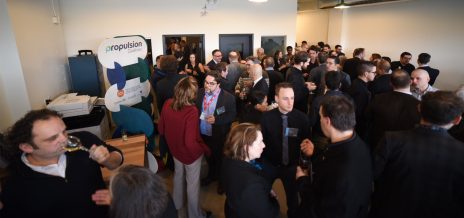
A Great Success for our November 28th Lunch Event!
We were pleased to welcome many members and partners from the smart and electric transportation ecosystem to our new offices for lunch on November 28. This event, which was an opportunity to celebrate our first year of operations, was a great success.
Read more
It’s a go!
This is it, the NAVYA electric self-driving shuttle is officially in service in Candiac!
Read more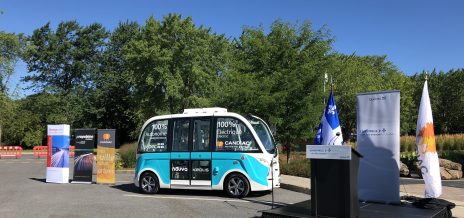
A first in Canada
Propulsion Québec is proud to announce the arrival of a self-driving electric shuttle in the City of Candiac.
Read more






